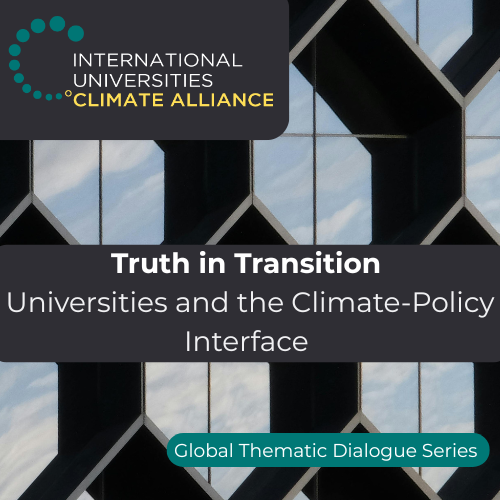25 September 2025
The International Universities Climate Alliance (IUCA) convened its final Global Thematic Dialogue for 2025, Truth in Transition: Universities and the Climate-Policy Interface, an online multidisciplinary event that explored how academic institutions can influence climate action in an era of uncertainty and misinformation.
About the Sessions
With registrations from 56 universities and organisations from 29 countries, the session brought together leading subject-matter experts to provide a snapshot of the complex relationship between evidence-based research and policy-making, and to explore related ideas.
Through a series of short, focussed presentations and open discussion, participants tackled pressing questions facing the climate research community: How can universities ensure their research informs policy? What strategies can counteract the growing tide of disinformation? And how can higher education institutions measure their real-world impact?
The IUCA is grateful to Dr Sasha Maher and Dr Maria Armoudian at the University of Auckland (NZ), and Professor Tom Oliver at the University of Reading (UK) for chairing the dialogue sessions.
Key Themes & Insights
Universities as trusted voices and the need for global networks and working collaboratively
Speakers emphasised the unique position of universities as credible sources of knowledge in a polarised information landscape. By working collaboratively through networks such as the IUCA, participants suggested that institutions should unite to help guide policy grounded in science, countering an increased prevalence of misinformation at a global scale.
Institutions leading by example through practice and the role of students as catalysts for change
Several case-studies and discussions highlighted the importance of universities leading by example by embedding sustainable practices into teaching and institutional governance. The important role of students in energising institutional conversations and extending sustainable practices beyond campus was also highlighted.
Navigating misinformation in an era of social media; engagement with communities and organisations
The influence of social media on public opinion and policy debates was another focal point of the dialogue. The need for researchers and policymakers to authentically engage and build relationships with civil society, NGOs, government, and industry was presented as essential for sustaining momentum toward climate goals and bringing everyone on the journey.
Case Studies
Universities collaborating for climate impact
